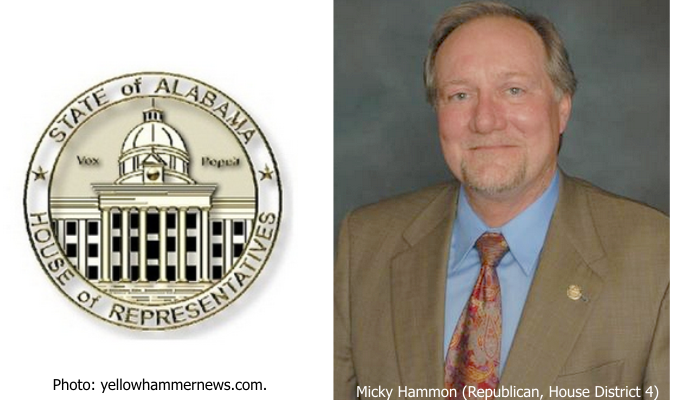SELMA, Alabama—In an effort to revive its agriculture production — still struggling under the effects of draconian immigration laws enacted in 2011 — the Alabama House of Representatives approved legislation Friday that would pave the way for the state to bring in up to 20,000 Christian Syrian refugees and resettle them in counties that have yet to recover from the exodus of Latino farmworkers who fled Alabama when the immigration laws were implemented.
The bill’s sponsor, Representative Micky Hammon (Republican, House District 4) — also cosponsor of the 2011 immigration legislation, the Alabama Taxpayer and Citizen Protection Act — said the state is “grateful and blessed” to contribute to international efforts to save “oppressed Christians.”
Speaking by telephone from Montgomery, Mr. Hammon said, “We figured it’s a win-win situation for everyone involved.”
“They’ll have a place to settle where they’ll have religious liberty and religious freedom and can be free Christians again. And we surely can use all the help we can get on our farms.”
Over the last four years, millions of refugees fleeing wars, violence, persecution, and poverty in over a dozen countries — notably Syria, Afghanistan, Iraq, Eritrea, Nigeria, Somalia, Sudan, Bangladesh, Pakistan, Serbia, Albania, Kosovo — have overflowed several countries on two continents, particularly Turkey, Jordan, and several European nations.
Syrian refugees make up more than half of the migrants. The United Nation estimates over 1 million Syrian refugees have fled to Turkey. And since early this year, over 700,000 migrants have made treacherous sea crossings, seeking a better life in Europe.
According to Mr. Hammon, while 20,000 Syrians migrants would not fully replace the estimated 80% to 90% of the Latino farmworkers who fled Alabama, the migrants would provide crucial farming help in several counties.
“Farm production in many counties, particularly in the northeast and the Black Belt, is still reeling and doesn’t looks good from here,” he said.
“In some counties even now, many farmers are still only planting half or less of their fields, that is, the ones that are still in business. Since 2012, many have had to just pack it in and leave their fields.”
The fields on Lee “Buddy” Jenkins 70-acre produce farm in Plantersville — 20 miles northeast of historic Selma — have been left fallow for over 3 years. Instead of raising bountiful harvests of sweet potatoes, tomatoes, cabbages, and blackberries, as his family has done since the early 1900s, in the lush, fertile, productive, deep-black soil of rural Dallas County, Mr. Jenkins commutes to “the other side of the Montgomery” and works as an electrician at a Hyundai automobile manufacturing plant.
When the immigration law passed, the 58 immigrant farmworkers he employed left Alabama, fearing being detained, jailed, and deported.
“When that law came on, they just upped and left,” Mr. Jenkins said. “It ran them off, and not even one even came back.”
“About half of ‘em left when the law passed. Then when the court rulings came down, the other half left. A few tried to lay low a bit. But they’d all done gone soon after that. So it left me, the wife, and our three kids to bring the harvest in that year. Wasn’t much left to decide after that. Just didn’t plant nothing the next year.”
Mr. Jenkins said he was not successful recruiting local workers willing to do “backbreaking, honest work.”
He told a The Colored Folks Times-Dispatch reporter, “Our colored folks down here just plain don’t have no more ability to do no kind of field work no more. We still don’t know how they got that way. They just more suited these day at doing indoor kinds of work.”
Our colored folks down here just plain don’t have no more ability to do no kind of field work no more. We still don’t know how they got that way.
Although some aspects of the immigration law were either amended by the Alabama legislature or struck down by court rulings — such as Alabama agreed not to publish on a government website a list naming immigrants it determined were “unlawfully present” in the state (the so-called scarlet letter law) — the aftermath severely depleted the number of farmworkers in the state, which so far has been irreversible.
Mr. Hammon is counting on the Christian Syrian migrants to “fill in that gap now.”
“For sure, there’ll be some hiccups initially,” Mr. Hammon said. “But once we get them all trained up, I’m sure we’ll see farming jump back up into high gear, back up to 2010 productivity levels. So in that respect, despite all the chastising from folks up North, we consider those laws to have accomplished what they’re supposed to do.”
The legislator said Governor Robert Bentley has already indicated he would sign the bill into law.
Willie Leroy Washington covers Deep South news. Givhan N. Cites reported from Plantersville.
Hammon Photo: yellowhammernews.com/blog/details-on-changes-to-alabama-immigration-law/


 Tavis Smiley and Cornel West Will Redo 2011 Poverty Bus Tour — Going to Meet the Man Poverty Tour
Tavis Smiley and Cornel West Will Redo 2011 Poverty Bus Tour — Going to Meet the Man Poverty Tour Mixed-Race Couple Files Complaint Against Kansas Hospitals — Denied “Free White Baby” Maternity Benefits
Mixed-Race Couple Files Complaint Against Kansas Hospitals — Denied “Free White Baby” Maternity Benefits Southern Baptist Convention Refused To Vote On Resolution “Will Negroes Be In Heaven”
Southern Baptist Convention Refused To Vote On Resolution “Will Negroes Be In Heaven” AG Jeff Sessions Will Go After Liberals Who Host Shows on Russian Cable TV
AG Jeff Sessions Will Go After Liberals Who Host Shows on Russian Cable TV
